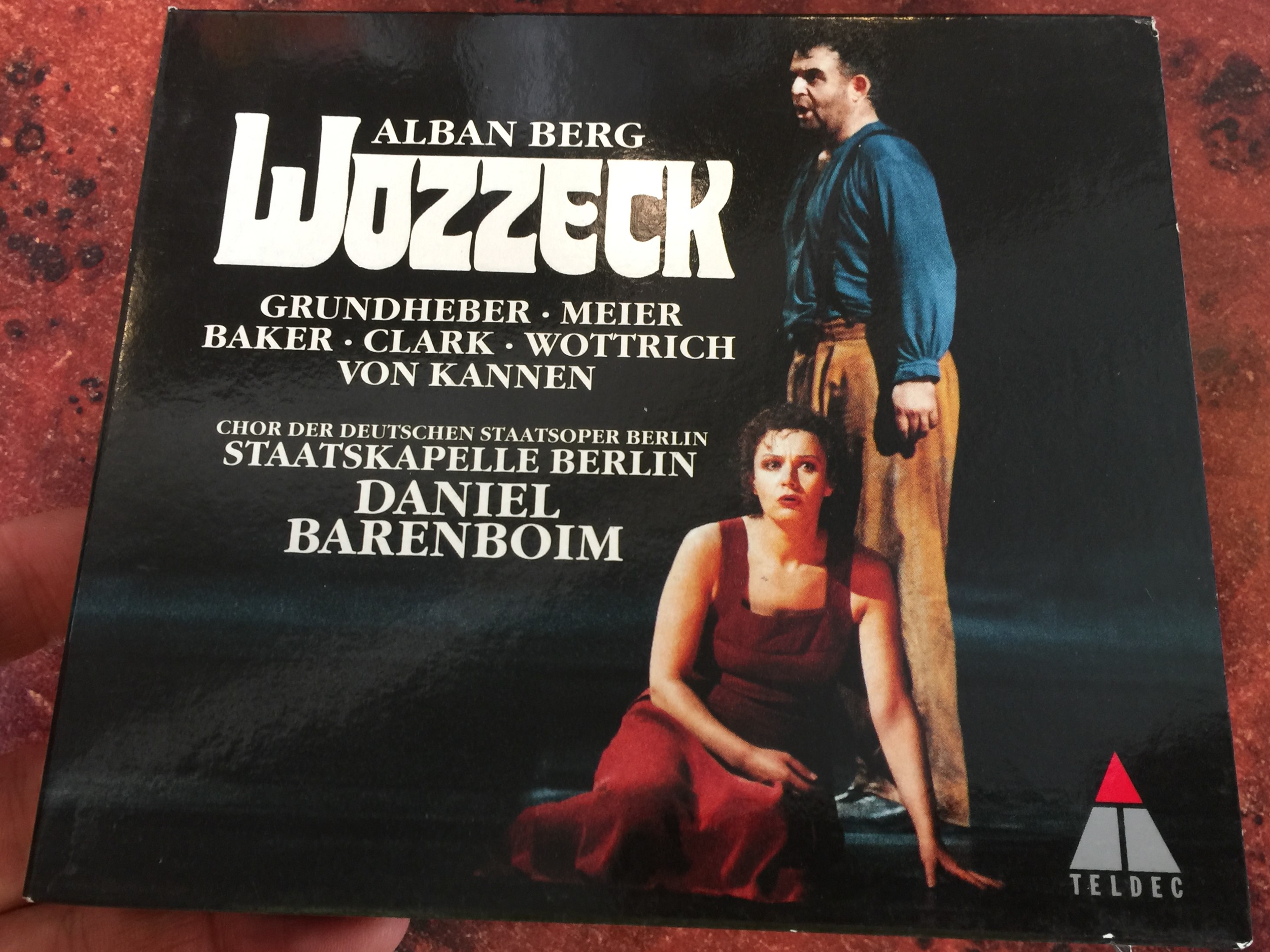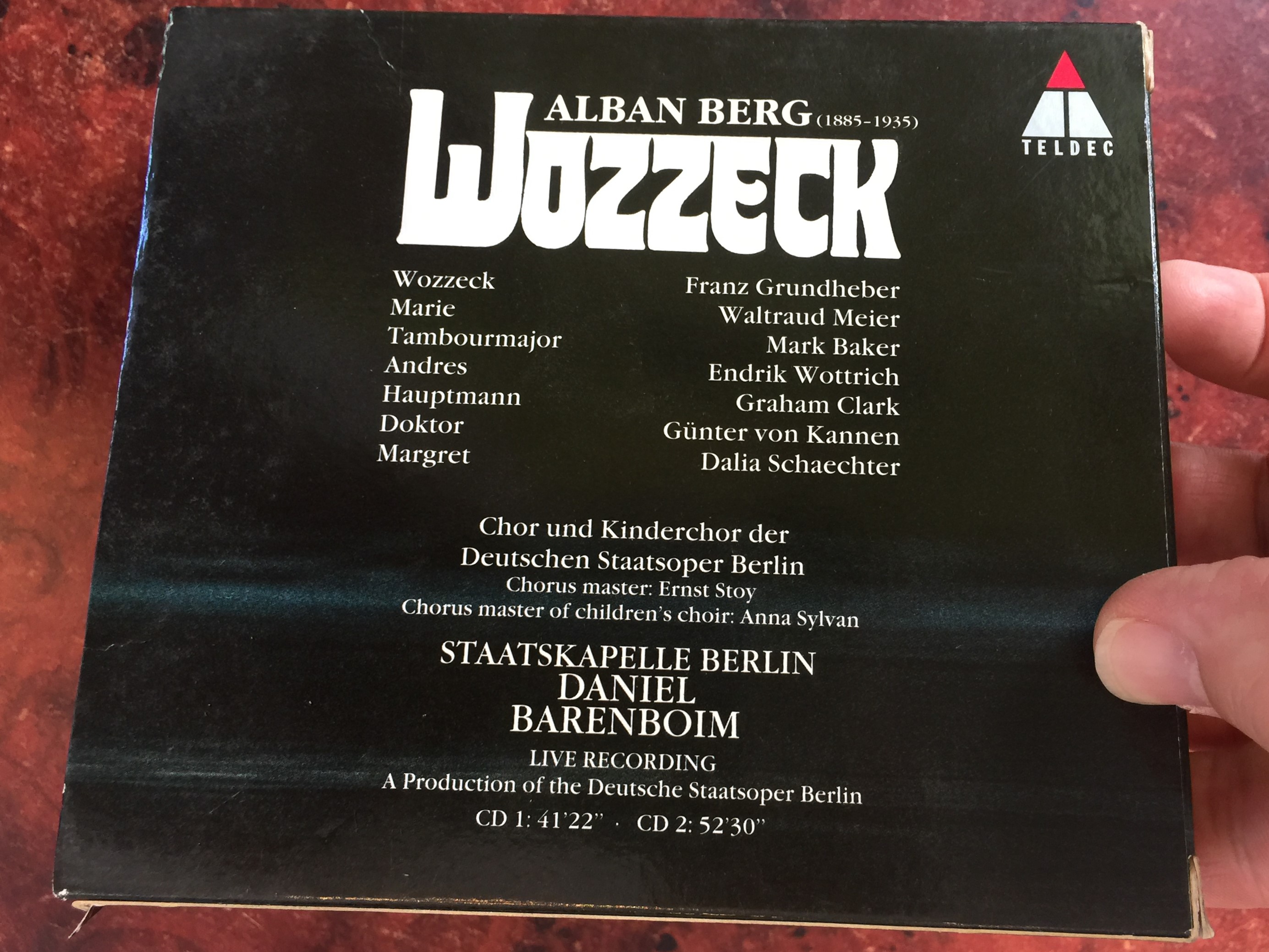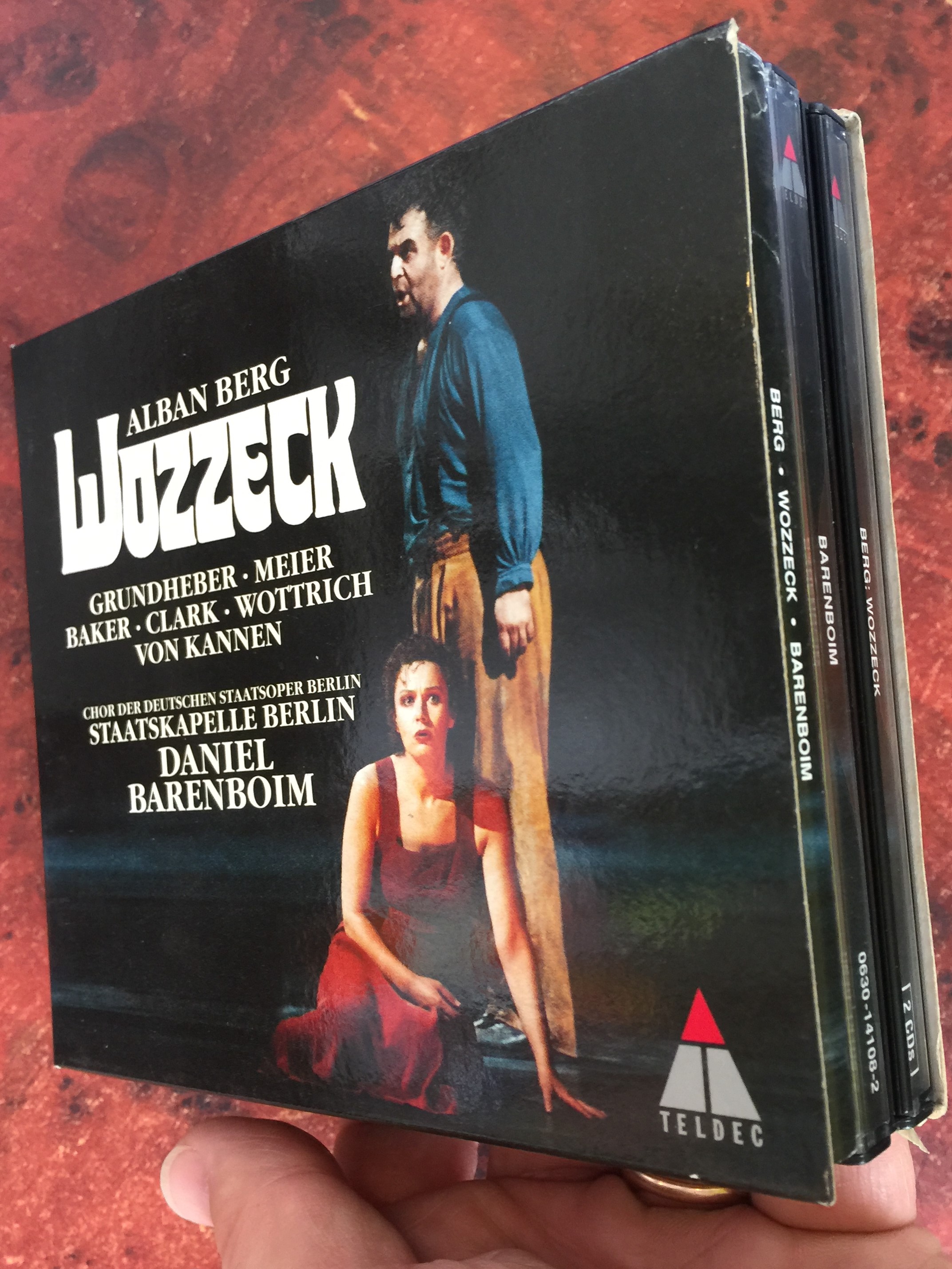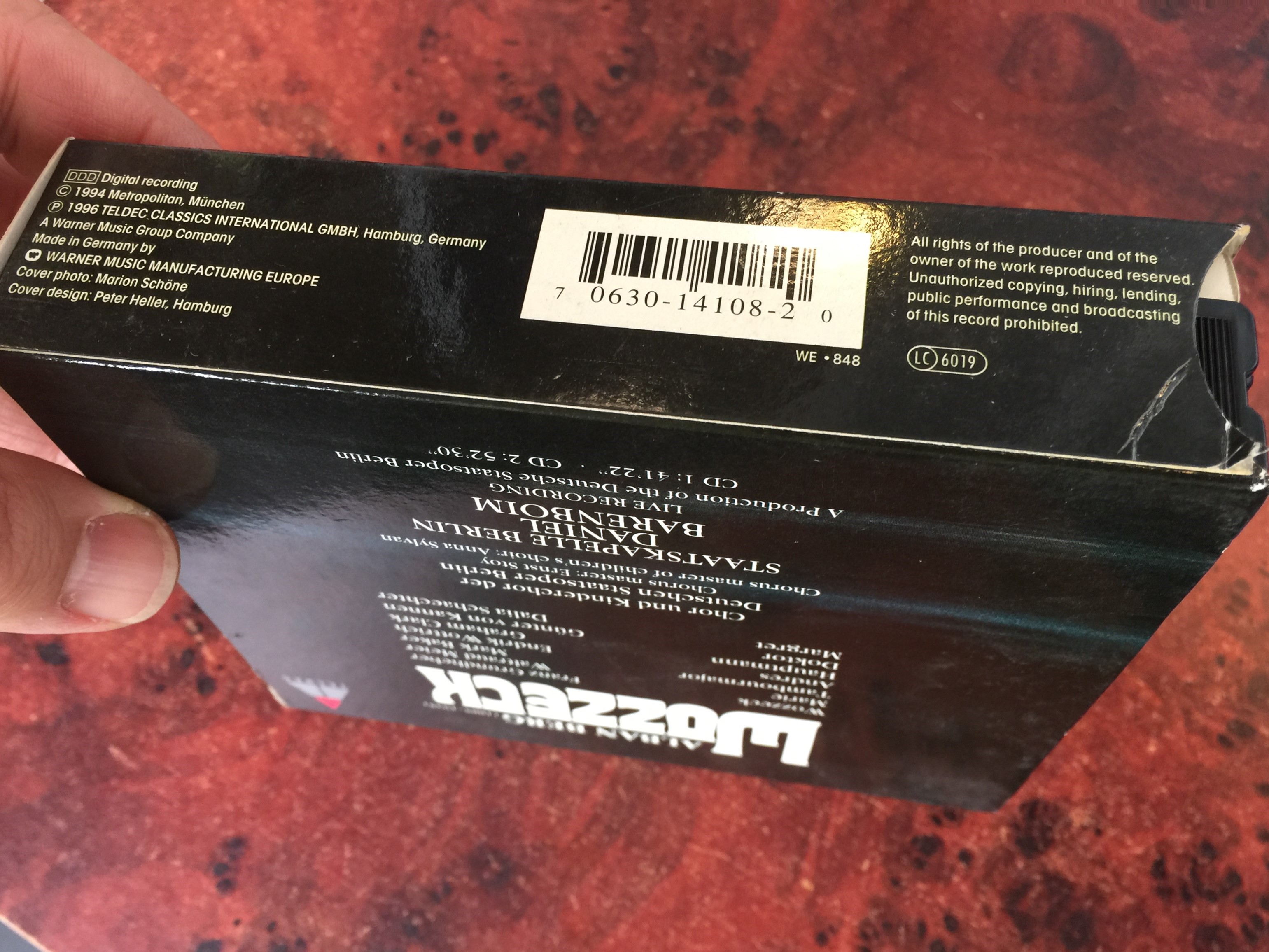Description
Alban Berg – Wozzeck / Grundheber, Meier, Baker, Clark, Wottrich, Von Kannen / Chor Der Deutschen Staatsoper Berlin, Staatskapelle Berlin, Daniel Barenboim / Teldec Classics 2x Audio CD 1996, Box Set / 0630141082
UPC 706301410820
CONDITION: USED - LIKE NEW!!! AS PICTURED!!
Product Details:
Tracklist:
| Wozzeck | ||
| 1-01 | Erster Akt 1. Szene (»Langsam, Wozzeck, Langsam!«) | 2:12 |
| 1-02 | Erster Akt 1. Szene (»Wozzeck, Er Sieht Immer So Verhetzt Aus!«) | 1:41 |
| 1-03 | Erster Akt 1. Szene (»Wozzeck, Er Ist Ein Guter Mensch«) | 4:07 |
| 1-04 | Erster Akt 1. Szene (Verwandlung) | 0:42 |
| 1-05 | Erster Akt 2. Szene (»Du, Der Platz Ist Verflucht«) | 2:40 |
| 1-06 | Erster Akt 2. Szene (»Läuft Dort Ein Has Vorbei«) | 2:42 |
| 1-07 | Erster Akt 2. Szene (»Still, Alles Still« & Verwandlung) | 1:54 |
| 1-08 | Erster Akt 3. Szene (»Tschin Bum«) | 1:21 |
| 1-09 | Erster Akt 3. Szene (»Komm', Mein Bub!«) | 3:04 |
| 1-10 | Erster Akt 3. Szene (»Wer Da?«) | 3:21 |
| 1-11 | Erster Akt 3. Szene (Verwandlung) | 1:05 |
| 1-12 | Erster Akt 4. Szene (»Was Erleb' Ich, Wozzeck?«) | 2:40 |
| 1-13 | Erster Akt 4. Szene (»Seh'n Sie, Herr Doktor«) | 2:15 |
| 1-14 | Erster Akt 4. Szene (»Wozzeck, Er Kommt Ins Narrenhaus!«) | 2:19 |
| 1-15 | Erster Akt 4. Szene (Verwandlung) | 0:38 |
| 1-16 | Erster Akt 5. Szene (»Geh' Einmal Vor Dich Hin!«) | 2:55 |
| 1-17 | Zweiter Akt 1. Szene (»Was Die Steine Glänzen?«) | 1:44 |
| 1-18 | Zweiter Akt 1. Szene (»'s Ist Gewiß Gold!«) | 1:13 |
| 1-19 | Zweiter Akt 1. Szene (»Was Hast Da?«) | 2:08 |
| 1-20 | Zweiter Akt 1. Szene (Verwandlung) | 0:40 |
| 2-01 | Zweiter Akt 2. Szene (»Wohin So Eilig«) | 4:32 |
| 2-02 | Zweiter Akt 2. Szene (»He, Wozzeck!«) | 2:12 |
| 2-03 | Zweiter Akt 2. Szene (»Was Wollen Sie Damit Sagen«) | 3:08 |
| 2-04 | Zweiter Akt 2. Szene (Verwandlung) & 3. Szene (»Guten Tag, Franz«) | 3:48 |
| 2-05 | Zweiter Akt 3. Szene (Verwandlung) & 4. Szene (»Ich Hab' Ein Hemdlein An«) | 2:46 |
| 2-06 | Zweiter Akt 4. Szene (»Er! Sie! Teufel!«) | 1:38 |
| 2-07 |
Zweiter Akt 4. Szene (»Ein Jäger Aus Der Pfalz«) | 1:44 |
| 2-08 | Zweiter Akt 4. Szene (»Jedoch, Wenn Ein Wanderer«) | 1:54 |
| 2-09 | Zweiter Akt 4. Szene (»Lustig, Lustig«) | 1:22 |
| 2-10 | Zweiter Akt 4. Szene (Verwandlung) | 1:04 |
| 2-11 | Zweiter Akt 5. Szene (»Andres! Andres! Ich Kann Nicht Schlafen«) | 2:20 |
| 2-12 | Zweiter Akt 5. Szene (»Ich Bin Ein Mann!«) | 2:27 |
| 2-13 | Dritter Akt 1. Szene (»Und Ist Kein Betrug In Seinem Munde Erfunden Worden«) |
1:56 |
| 2-14 | Dritter Akt 1. Szene (»Es War Einmal Ein Armes Kind«) | 3:07 |
| 2-15 | Dritter Akt 2. Szene (»Dort Links Geht's In Die Stadt«) | 5:27 |
| 2-16 | Dritter Akt 3. Szene (»Tanzt Alle; Tanzt Nur Zu«) | 3:00 |
| 2-17 | Dritter Akt 4. Szene (»Das Messer? Wo Ist Das Messer?«) | 2:26 |
| 2-18 | Dritter Akt 4. Szene (»...Blut...« – »Halt!«) | 1:52 |
| 2-19 | Dritter Akt 4. Szene (Verwandlung) | 3:40 |
| 2-20 | Dritter Akt 5. Szene (»Ringel, Ringel, Rosenkranz«) | 1:55 |
About this Work:
Wozzeck is the first opera by the Austrian composer Alban Berg. It was composed between 1914 and 1922 and first performed in 1925. The opera is based on the drama Woyzeck, which the German playwright Georg Büchner left incomplete at his death. Berg attended the first production in Vienna of Büchner's play on 5 May 1914, and knew at once that he wanted to base an opera on it. From the fragments of unordered scenes left by Büchner, Berg selected 15 to form a compact structure of three acts with five scenes each. He adapted the libretto himself, retaining "the essential character of the play, with its many short scenes, its abrupt and sometimes brutal language, and its stark, if haunted, realism..."
The plot depicts the everyday lives of soldiers and the townspeople of a rural German-speaking town. Prominent themes of militarism, callousness, social exploitation, and casual sadism are brutally and uncompromisingly presented. Toward the end of act 1, scene 2, the title character (Wozzeck) murmurs, "Still, all is still, as if the world died," with his fellow soldier Andres muttering, "Night! We must get back!" seemingly oblivious to Wozzeck's words. A funeral march begins, only to transform into the upbeat song of the military marching band in the next scene. Musicologist Glenn Watkins considers this "as vivid a projection of impending world doom as any to come out of the Great War ....
More Details:
- Booklet Editor, Liner Notes [Synopsis] – Ingrid-H. Verch
- Chorus – Chor Der Deutschen Staatsoper Berlin, Kinderchor Der Deutschen Staatsoper Berlin
- Chorus Master – Ernst Stoy
- Chorus Master [Chorus Master Of Children's Choir] – Anna Sylvan
- Composed By – Alban Berg
- Conductor – Daniel Barenboim
- Design [Cover] – Peter Heller (2)
- Edited By [Digital] – Alexia Benoit
- Engineer – Jean Chatauret
- Engineer [Assistant] – Christian Feldgen
- Libretto By – Alban Berg
- Liner Notes – Hans-Christian Schmidt
- Liner Notes [English Translation] – Stewart Spencer
- Liner Notes [French Translation] – Hélène Chen-Ménissier
- Liner Notes [Libretto, English Translation] – Sarah E. Soulsby
- Liner Notes [Libretto, French Translation] – Anne Servant
- Orchestra – Staatskapelle Berlin
- Other [Production and Staging] – Patrice Chéreau
- Photography By [Cover] – Marion Schöne
- Producer – Martin Sauer
- Typography [Typesetting] – Offizin Paul Hartung
- Vocals [1. Handwerksbursche] – Siegfried Vogel
- Vocals [2. Handwerksbursche] – Roman Trekel
- Vocals [Andres] – Endrik Wottrich
- Vocals [Doktor] – Günter von Kannen
- Vocals [Ein Soldat] – Motoki Kinoshita (2)
- Vocals [Hauptmann] – Graham Clark (2)
- Vocals [Margret] – Dalia Schaechter
- Vocals [Marie] – Waltraud Meier
- Vocals [Mariens Knabe] – Henrik Zauber
- Vocals [Narr] – Peter Menzel
- Vocals [Tambourmajor] – Mark Baker (21)
- Vocals [Wozzeck] – Franz Grundheber
Review:
This is an excellent performance of a great modern classic. The live production is from 1994, with Daniel Barenboim conducting and Franz Grundheber as Wozzeck and Waltraud Meier as Marie. It generally surpasses Claudio Abbado's 1988 live version with the Vienna Philharmonic and with Franz Grundheber as Wozzeck since the singers are all very good and the sound is better, allowing the singing to hold its own with the orchestra in the loud spots. Abbado is wonderful in bringing out details in the score and in projecting Berg's compassion for his protagonist, and, of course, his orchestra is superb, but Barenboim is equally wonderful, though his orchestra isn't quite the match of the Vienese. In addition, Waltraud Meier as Marie is far superior to Hildegard Behrens in the Abbado set; Ms. Behrens seems just too old and tired for the role.
We should, however, mention the great and classic account by Karl Bohm with the equally great Dietrich Fischer-Dieskau as Wozzeck (the best ever!) and Evelyn Lear as Marie. That 1960s studio recording is still one of the best of this work, and because it's in the studio, the voices come over in perfect balance with the orchestra, never drowned out, as in Abbado's. The combination of the warmth of both Bohm's approach and Fischer-Dieskau's marvellous voice make it a monument to the art of recording. It's interesting that both Bohm and Barenboim are equally great conductors of Wagner, especially of TRISTAN.




























